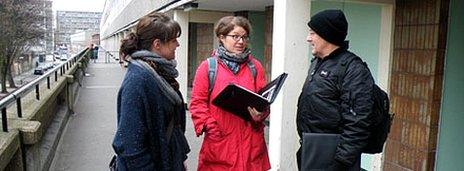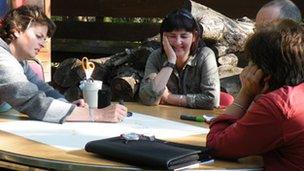What does the Big Society mean on the ground?
- Published

Three of the organisers working in Walworth, South London
Over the past six months, I've been following three people in the hope of understanding what the Big Society means.
They aren't ministers, civil servants or journalists, but the vanguard of a planned new force of 5,000 community organisers, intended to shake up the process by which local people can help their own neighbourhoods.
Trained by an independent charity but paid for by the government, they are the result of one of the more surprising commitments in the last Conservative manifesto.
The idea is simple: to re-knit the social fabric in communities where it has worn out. In the process, the organisers will bring people together and support them in making changes for themselves.

Trainees used craft to build their idea of community
Gathering at sunny Trafford Hall last September, they were told by the trainer, Stephen Kearney, that the programme "is about nation building, it's about town-building, it's about community building".
"All the assets are out there. People are out there and they need encouragement."
Mr Kearney's charity, RE:generate, is part of the consortium which won the contract to train the organisers, and he developed the model they learn.
Central to it is the golden rule of organising: "Never do for somebody what they can do for themselves."
According to Mr Kearney, this represents an important change of mindset from some previous community development efforts.
"We've had money pouring into communities. We've had people consulting, but consulting with an agenda," he says, "so it's not about the agenda of the people."
Community organising is not without its own critics. They are far from delighted that over the next five years public money will fund a year of training for 500 of the organisers, working in communities across England.
'Better off knocking it down'
These organisers are told that their job, at least at the start, is to listen. They are taught a highly structured conversational technique which aims to lead people towards taking action to resolve their concerns.
It starts by asking them what they love about where they live, about their concerns, then asks what ideas they have to change that, and ultimately whether they are prepared to get involved.

Abby (left) and Sharon (centre) during the training last September
On the Aylesbury estate, in Walworth, south London, I went out knocking on doors with Zara Lloyd, a trainee organiser. I watched a conversation that started with "they're better off knocking down the estate" end with the resident admitting he was keen to get involved in improving things.
Several months later, and on the same estate, a small meeting of residents took place in a front room and agreed to try and clean up their patch, perhaps paint their doors to brighten the place up a bit.
Two of the people in the room had lived next to each other for four years, but only met for the first time the previous week. Now they were agreeing to take action together.
Mr Kearney says that in time these projects grow and become more ambitious. They might develop into companies or new local voluntary groups, dealing with everything from crime to unemployment and even low turnout at elections.
But if progress towards these ambitious goals is visible, it is also painstaking.
In Thetford, Norfolk, organiser Abby Stancliffe-Vaughn is wrestling with deep divisions between English and eastern European residents.
Meanwhile on the Thornton estate in Hull, there has been progress in recent years, but organiser Sharon Darley still faces enormous challenges and many residents still do not believe they can solve problems for themselves.
This approach to organising - focusing on individuals rather than building power more rapidly through institutions - takes time.
In fact it takes a long time, four or five years, but the public funding does not last as long.
Once their one year of training is complete, the government pulls back. The brains trust around the prime minister which promoted this idea was clear from the off that while they did see a government role in training community organisers, they did not want them to become another arm of the state.
And there are other questions, too. This first batch of organisers, having been told there were no targets, now have targets to meet.
Some organisers complain that the approach can be rather too "one-size-fits-all", and there are questions about how far community organising differs from good, locally grounded community development, working to support people rather than just doing things for them.
Mr Kearney says he is learning rapidly, too, and that the training is now being better tailored for future groups.
He adds that since the changes community organising brings often save money and make communities better places to live in, councils are frequently keen to get involved.
Based in some of the most socially fragmented areas of the country, the organisers are facing everything from chronic drug misuse to deep racial tension. It will be a tough challenge.